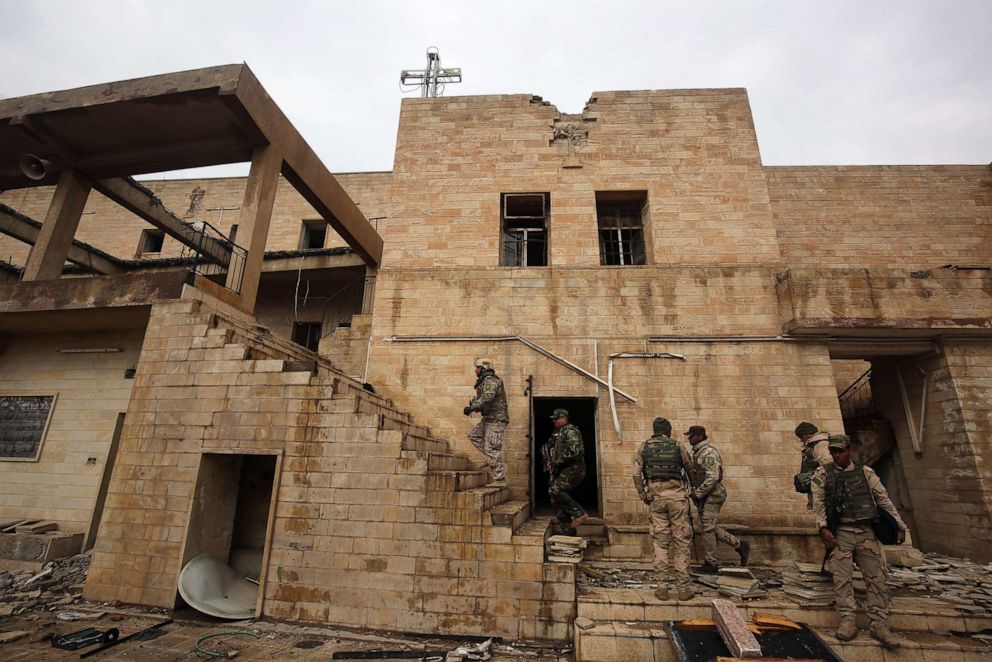Body of man with diabetes deported to Iraq returned home to US for family burial
Jimmy Aldaoud lived nearly his whole life in the U.S., but was deported to Iraq.
The body of a 41-year old man who was deported to Iraq and died was returned to the U.S. on Friday, according to his family and a local congressman.
Jimmy Aldaoud had lived nearly all of his life in the Detroit area, where he will be buried next week alongside his mother. He died on Aug. 6 from health problems in Baghdad, where he was sent in June, but where he knew no one, didn't speak the language, and didn't have access to proper care for his diabetes or schizophrenia.
His case has become a focal point in the debate over President Donald Trump's immigration policies, including targeting for deportation Iraqis who had years-old removal orders.
"Jimmy was a sweet person with a good heart. He loved our mom, and we are comforted knowing that he will be laid to rest next to her," his sisters said in a statement Thursday. "We hope Jimmy's story opens people's eyes and hearts to understanding that we should not be deporting people to their death overseas."

A private funeral will be held next week.
Aldaoud had never stepped foot in Iraq. Born in a refugee camp in Greece to Iraqi parents, according to his congressman and lawyers, he and his family applied for refugee status in the U.S., where Aldaoud arrived when he was, at most, a 1-year-old child.
He had a criminal history, including disorderly conduct, but "his mental health was the primary reason for his legal issues that led to his deportation," according to Edward Bajoka, an attorney and family friend, who said Aldaoud was a paranoid schizophrenic.
"I begged them. I said, 'Please, I've never seen that country. I've never been there," Aldaoud said in a video reportedly recorded two and a half weeks after his deportation and shared on social media.
"I'm here now, and I don't understand the language, anything. I've been sleeping in the street. I'm diabetic, I take insulin shots. I've been throwing up, throwing up, sleeping in the streets, trying to find something to eat," he said in the video.
Aldaoud is one of hundreds of Chaldean Iraqis -- an ancient Catholic sect with roots in modern-day Iraq that has been historically persecuted in the Middle East -- who the Trump administration has moved to deport because of previous final orders of removal. Some, like Aldaoud, have lived in the U.S. for decades.
"Jimmy's death has devastated his family and us. We knew he would not survive if deported. What we don't know is how many more people ICE will send to their deaths," Miriam Aukerman, senior staff attorney with the American Civil Liberties Union's Michigan branch, told ABC News in a statement earlier this month.

The ACLU was part of a 2017 lawsuit against the administration on behalf of Chaldeans and other Iraqis who have been facing deportation, arguing they had a chance to plead their case in an immigration court first. In June of that year, ICE agents began arresting hundreds of Iraqis in the Detroit area who had final orders of removal because of previous criminal records.
Initially, a federal judge ruled that the group of Iraqis still had the right to appear before an immigration court, in particular because they would face persecution and increased violence in Iraq. More than 300 Iraqis were able to ask an immigration court to rehear their case, with 40 or so winning relief so far, according to the ACLU.
But last December, a higher court overruled that decision, and this past April, it closed the door to further hearings. Weeks later, Aldaoud was detained by ICE and deported.
"Unfortunately, I believe we can expect to learn of more stories like Jimmy’s if deportations of vulnerable Iraqi nationals continue," said Rep. Andy Levin, D-Michigan, whose district includes the largest Iraqi-born community in the country.



